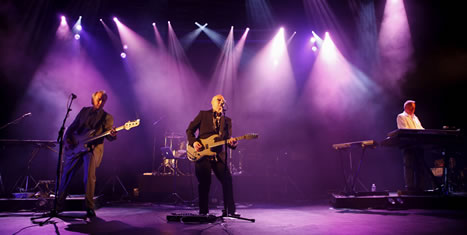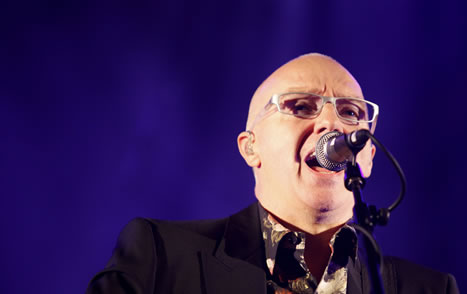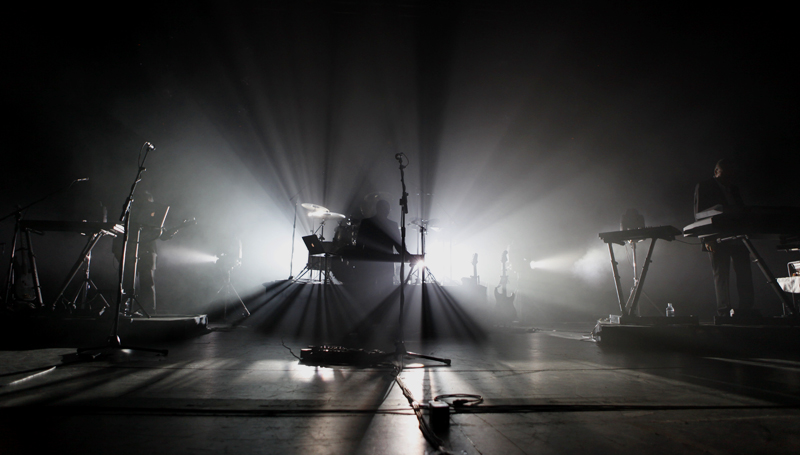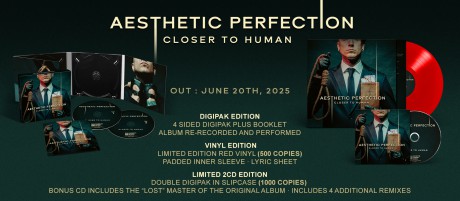
The new Ultravox album “Brilliant” is here. After reviewing it I was given the opportunity to interview singer/guitarist Midge Ure and ask him a few questions regarding the recording of the album, the forthcoming tour and life in general. It has been a long time since the last Ultravox album and a staggering 28 years since an album featuring the classic line up of Midge Ure, Billie Currie, Chris Cross and Warren Cann.
Locked away in the middle of nowhere
Being called by the EMI representative and exchanging courtesies Midge said hello and this is what followed.
Thank you for “Brilliant”, it is a well named album!
- Thank you. It wasn’t named “Brilliant” because we thought it was brilliant, it was originally named “Brilliant?” with a question mark. We asked ourselves: are we as brilliant as we think? So it was rather fortunate that we chose that name from the title track.
I had the privilege of seeing the first reunion gig of the “Return to Eden” tour in Edinburgh, is this sort of a natural progression from that?
- If you saw the first gig in Edinburgh, then you saw what was a revelation to us, and something that we had sort of forgotten. That is that we are a rock band and a very powerful one. It is a very powerful sound that we make. I think we tried to take some of the energy that we got from the tour and put that into new recordings. There are some very powerful guitar driven tracks on the “Brilliant“ album and that is mainly because of that tour. We kind of rediscovered ourselves again, we realised that we were actually quite a good band. It wasn’t all about the synthesizers and it wasn’t about what everyone had written for the past 15 years. I am a guitarist first and foremost you know and it was great to see Billie with the violins so that appears on the record. We dug out his old ARP Odyssey synthesizer for some of the solos. We were inspired, I think, by that tour.
So you sort of found each other again on the tour?
- We did get along on the tour brilliantly and decided to make an album. It is such a weird thing to do what we did, to lock yourself away like we did in Canada, with no one else around. It was just Billie, Chris and I. Warren had commitments in Los Angeles and he didn’t have to be part of it until later on. It is quite a dangerous thing to do, because in that kind of tense environment thing could have easily gone horribly wrong. We were in the middle of the woods, in a cabin by the lake, it is freezing cold and there is no one there to talk to other than the band. But it worked out brilliantly mainly because we got along so well and the creativity was there. So the process of recording this was easy, it was great, it was very vibrant and exciting.

Live 2009.
Photo by: Fredrik “Schlatta” Svensson (Release)
The untouchable castles of the 80:s are gone
I’ve watched all the videos on the “Brilliant” microsite of course. It gives a great insight to the recording process, how important are the social medias nowadays you think?
- I think it is very important. Up until 2 years ago I wasn’t on Twitter and up until 6 months ago I wasn’t on Facebook because I didn’t see any point of it. Now I have realised that they are major tools for connecting with people. It is not how it used to be back in the eighties, where you lived in kind of untouchable castles and everyone else around you could not get near you. Now people can write to you, email you and tell you what they think about particular tracks, they can comment on mixing and all that. They can even edit their own fan videos and put them on YouTube and you can too. That is an amazing thing; everything is accessible which it wasn’t before. I’m finding it really fascinating.
Do you think it is easier to reach your audience now or is the overflow of information in fact making it harder?
- You’re easily reaching your die hardcore of fans, but then they send it to their friends and so on so. You have a lot of channels, our band sites, Twitter feeds, personal Facebook pages and so on and when you give them just a bit of information the readers send them on to their connections. Say you have 20 000 followers on Facebook following just me, but within moments that 20 000 can spread to 200 000 and even more. And another thing that is interesting is that not everyone follows everything, it is a different process and different people prefer various media platforms. So it is quite interesting to see that it doesn’t all cross over.
And it is instantaneous; you don’t have to wait two months to see it in print.
- Absolutely. The other day I’d forgotten that I’ve done an interview on the radio so I then wrote about it on Twitter and a whole pile of people listened to it just because I said I’m on in an hour. It is immediate.
How was the writing process initiated? Has it changed?
- It used to be kind of slow. Historically, how we used to do it was with a room full of equipment and a rehearsal room and you would spend months in there until you all had contributed your stuff and had enough songs to record. This time around it was very different, we built these little laptop studios and the moment we had something we were happy with we recorded it. And we recorded it with the attitude that we’d probably change it later, which we didn’t. So 90 percent of what we recorded in Canada, in that environment, ended up on the album. A lot of the guitars, drum programming, keyboards that we thought we were going to replace with proper pianos on are on there. We ended up liking the sound and the atmosphere we created there and then and kept it all (almost). The process itself was actually very similar in a way to how we used to do it. We’d sit around jamming, Billie started playing the piano, and I added the guitar and Chris would make the bass lines. We talked about what were interesting combinations of chords and key changes and any of that stuff. But as I said, rather than recording on a Dictaphone and then go and record it in a studio months later, we recorded it there and then. The technology has changed the entire approach to it now; it is a whole different thing.
Use what you have
What kind of recording equipment did you use?
- We took 4 Macbook Pros and built 4 studios; we had one large one dedicated to the main recording area. Then each of us had a separate little setup in various parts of the house where we did various little things. Once we had something in the main computer, we’d all take a copy and go and work on our own part, me working on guitars, Billie on keyboard parts or whatever and Chris would work on bass parts in his room. Billie would listen to stuff and edit things round, so it was a little hive of activity. It was like a creative factory in a way, but with no pressure. It was so easy and relaxed the entire thing.
Did you use Logic of Pro Tools or any other sequencing program?
- We did use Logic and we tried to keep it so that all of us had the same instrumentation, although that didn’t really happen since each individual would end up buying something new that the others didn’t have. We tried to keep it so that the core sound sources were all the same so they were interchangeable. Billie had very specific synths that he wanted to use and the same with Chris’ basses. It was a lot of technical knowledge that went in to it, but it was all us, no engineer and crew. If we couldn’t carry the equipment on a plane to record this, we didn’t take it. So we were kind of limiting ourselves to very basic setups. That makes you think about what you actually trying to achieve.
You get more creative and not buried in technology?
- Absolutely, I think with more and more stuff you can spend days listening to bass drum sounds. Thousands of bass drums, thousands of snare sounds or whatever, and if you have the entire spectrum in front of you, you never get anything done. So by limiting what you actually have you’ve got to be creative with that.

Live 2009.
Photo by: Fredrik “Schlatta” Svensson (Release)
What is the Ultravox sound?
One thing that struck me is that it is instantly recognizable as Ultravox, what do you think makes the soundscape so familiar?
- When you think about it, there are certain instruments that you cannot change. A guitar sounds like a guitar; drums sound like drums, a piano sounds like a piano. If you listen to the key track “Brilliant”, it is mainly guitar, synthesized bass and drums. That is very basic stuff, people listen to it and go “oh yeah that is Ultravox, the synthesizer band”. No, there are hardly any synthesizers on there. It is more to do how the individuals think when they come together as a band. Ultravox will sound like Ultravox irrespective of what instrumentation we use. So if we sat with a piano and a drum and me singing, it would still sound like Ultravox because it is how we think about the melodies. It is how we make notes interact with each other, that’s what creates the imagery and the atmospheres. The synthesizers and electronics are icing on the cake really. They are great helping you with atmospheres and ambiances, but when it comes to the actual music itself if you listen to “Fall” which has very little in it and it still sounds very very Ultravox.
So where do you find the melodies?
- I have no idea! I am not trained at all. I discovered maybe 15 or 20 years ago when I was doing some solo stuff, that I think that a lot of my sense of melody comes from traditional Scottish music. Not that I ever studied it, nor that I ever had anything to do with it, but we were taught it as children as school. You’re taught traditional songs and melodies and the Scottish traditional songs have got some beautiful melodies. So it is a combination of what I was taught as school and what I heard on the radio when I was a kid. A lot that I heard on the radio was beautifully constructed songs from the likes of Frank Sinatra. I got a sense of melody from there and I think there is an element that comes across in all aspects of what Ultravox do. We are a very melodic band and that is nothing to be ashamed or shy away from. It is quite something that you can have that sense of melody in a rock tune.
This is a question I usually ask. The album is very dynamic sonically, how do you feel about the so-called loudness war?
- It is one of those weird things. I didn’t go to the cut, when they master the album, I always feel that I can contribute absolutely nothing. To me it is a dark art. I have no idea what they do, but I know there is a tendency these days to make the records sound as loud as they can possibly be and that to me just flattens the whole experience. You might as well just put the entire thing through a huge compressor, because it will just make it pump. I think that dance music is quite possibly responsible for this. It is not about the volume anymore, in the old days when you were cutting on vinyl, you had to try and make it as loud as you possibly could, because it then made a difference to the sonic elements of the record. But you were limited to how much you could put on one side of an album, so you tried to make it as loud as you could. These days it doesn’t really matter, you could just turn up the volume, it is not a problem. Everyone seems obsessed with this thing that it has to jump out of the speakers. A lot of the stuff that we do doesn’t need that. It is all about textures and dynamics as you say.

Live 2009.
Photo by: Fredrik “Schlatta” Svensson (Release)
Tour preparations like a wrestling match
What can we expect from the forthcoming tour?
- We haven’t quite decided yet. We have decided what not to do and we are not coming out and play the entire new album. That is too much for people, there will be an element of the audience coming to see this who hasn’t heard the entire album. So we will chose, carefully, what we want to play from the new album, and we haven’t attempted to play anything live yet. We have not started the rehearsals yet. It is one thing recording things and then having to play and sing it with different melodies and time signatures, that is a difficult task. So we will chose carefully which songs from “Brilliant” we want to perform, obviously that is what we want people to hear. But equally so it is important that people get to hear stuff that they know: the hits and classics. Then you have to balance the low tempo with up-tempo in your face ones. That’s going to be a long hard wrestling match between the four members of the band. It is going to be a bit of everything.
And the instrumentation will be roughly the same as on the “Return To Eden” tour I guess?
- Yes, the sound sources will be the same. Maybe different guitar amps and such things, we spent a lot of time prior to the tour 2 years ago organising this so that we could get the band sounding as good as possible and it would be stupid to throw all that away. There are a few updates we need to make, other than that I think we got it fairly organised now.
Sweden is graced with 3 concerts; you must like Sweden I guess?
- We did the “Forever Young” thing where we played six shows in Sweden. And we really enjoyed it. It was really nice driving up and down the country and spending some time there. Normally you go to Stockholm and Gothenburg and that’s it so it was nice to go to Linköping and places like that. You guys have a great life-style.
Charity work easy for artists
You’ve been involved in a lot of charity work throughout your career, Band Aid Save the Children and many more, could you elaborate on that?
- It is nothing you would naturally sit down and plan. Most of my career has not been planned; it just moves on and takes you to some interesting areas sometimes. The Band Aid stuff was never planned nor Save the Children. Things that are close to my heart, you can’t go to somewhere like Africa and see the things you’ll find there and then just walk away from it. You go there and it affects you and you take a little bit of Africa with you when you come back. You find yourself getting involved more and more with a variety of things and it is nothing I planned of doing and more importantly, it is not a hardship. If you have achieved certain fame or notoriety or whatever in any field, artistry, acting business or politics, it is no great hardship putting your name to something and lending your strength and public image to a cause. People forget, you weren’t asked to climb a mountain or fly around the moon, you were asked to walk on stage and do what you enjoy. Had someone said you have to walk from the north of Scotland to the south of England for charity, I might have thought twice about it, I’m not sure that is for me. To be asked to walk on stage and do a performance, that is easy.
The record label representative asks if I could make the next question the last one. Glancing through the papers of unanswered questions I pick one sort of at random.
What is the pipeline after the tour? More opera or Celebrity Master Chef?
- Hahaha, no I think my Celebrity Master Chef days are well and truly over. I don’t know, to tell you the truth. I think we have to wait and see what happens with the record. We are off to a good start with it, it would be nice so see it continuing the way it is going. If the record is successful then the tour may be extended, it is a decision we’ll make later. Right now we have got enough to think about with the record being out, thinking about which song the next single will be. And of course preparing for the tour is the big thing now, that is the light at the end of the tunnel right now. That is what we are focusing on.
Thank you so much for your time, see you in Gothenburg in October!
- Fantastic! Yes, see you there.
Ultravox has revealed a 30+ date tour to present the “Brilliant” album across Europe through September to November. Tickets are on sale now.
May 2012 press photo of Midge Ure and Billie Currie by: Keith Martin

